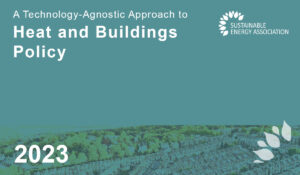No products in the basket.
Heat and Buildings Report recommends A Technology-Agnostic Approach to Policy
The Sustainable Energy Association have today formally launched their latest report on ‘A Technology-Agnostic Approach to Heat and Buildings Policy’ at the launch event with PRASEG – All Party Renewable and Sustainable Energy Group at the House of Commons, in London.
As members of the Sustainable Energy Association, we are proud to have contributed to the report and delighted to have attended the launch event in London and hear the expert panel outline the key findings of the report.
 The report assesses the current policy landscape for decarbonising heat and buildings, and why tailoring government policies to focus more on applying the right technologies for the right outcomes is the best route to Net Zero and buildings fit for the future.
The report assesses the current policy landscape for decarbonising heat and buildings, and why tailoring government policies to focus more on applying the right technologies for the right outcomes is the best route to Net Zero and buildings fit for the future.
The report can be read in full on this link.
The SEA advocates a ‘fabric-first’ approach to decarbonisation of the built environment and recommends that Government policy should incorporate a diverse range of low-carbon technologies, deploying a technology-agnostic route to deliver the Net Zero agenda. We are thrilled that infrared radiant heating is included within the report, there is no one size fits all solution, and we know the wide range of benefits infrared heating offers.
With simple installation infrared heating provides a practical, affordable and efficient solution for buildings that can be quickly deployed at scale. In addition, infrared heating technology delivers on comfort for people and its radiant properties enhance the health and wellbeing of the indoor environment. The presence of damp and mould is reduced and as infrared is not convective, it does not create air currents around rooms, the movement of dust and allergens is minimised.
We will continue to promote the benefits of infrared heating as an efficient, effective heating solution and look forward to further collaboration with The Sustainable Energy Association to advocate the need for a broader, more flexible approach to heat and buildings policy. Infrared heating has a significant role to play in progressing UK net zero targets more quickly, we need the government policy to assist and support us in this.

